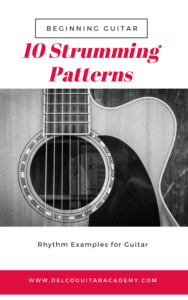6 Ways to Tell You Need Lessons
Looking for music lessons? Do you find yourself looking around youtube for hours, but not actually getting any progress finished on your instrument? In our DGA group, we often talk to people on the internet that are convinced they don’t need need lessons….or maybe they do, they’re never sure. Our experience teaching students of all ages gives us insight that people may not realize they are doing, and in this article, we put together 6 ways to tell that you do need lessons.
Playing in Boxes
Let’s say you’re playing for a few years now. You can play lots of songs, you know tons of chords, and maybe you’ve played a few gigs.
When you improvise, you don’t have a way to come up with material quickly, and you often find yourself stuck, or worse, simply playing the same types of things you always do.
You don’t need to know every scale ever created by mankind, but, you do need to know the basic scales everywhere on the fretboard. You also need to know how to use these scales as fuel for improvisation and writing tunes. If you don’t, you are crippling your own creativity, period.
Breathing........or a lack of breathing
You have to breathe to live! This may not be news to you, but there are a great many students who struggle to make this mind body connection, we see it all the time. The issue is never felt by the student unless there is a teacher watching you, making a comment on it. If there is no teacher, the student simply doesn’t realize they are taking giant breaths and playing for 20-30 seconds or more.
Playing guitar is not the same as getting a shot at the doctor, or preparing your body to run a marathon or a fight. This is an important distinction here, the small muscle macro control. You need to stay relaxed. Even playing at high speeds, relaxation is key.
Try this, download one of our ebooks by clicking here, and try playing some of the exercises. Try playing them in the mirror, and see if you can see yourself breathing!
Staying Loose
To continue with the last example, this is another one that students simply do not have enough mind-body connection to notice this. Staying Loose means keeping your hands and fingers flexible, and playing with as little tension as possible. As with breathing from before, these things are immediately easy to notice to a trained teacher, and we help students notice these problems and offer steps to fix them.
If you practice sitting down, try to examine how you feel when you finish. When you stand up, are you sore anywhere? In the neck? Back? Shoulders? Legs? Hands? Usually this is a sign something strange is going on in your playing.
Try to practice simple exercises like the ones in our strumming pattern ebook with the minimal amount of tension needed to play them.
Legs Shake
Staying loose is important, and if you’re tense, surely this is a sign you need lessons. Another sign is that your legs shake when you play. This is another sign of a building up of tension in the body. There are many ways tension builds up, and tension is the enemy!
Tension is an absolute killer in your playing. There is nothing helpful about it all. It’s not weightlifting, you don’t need massive strength to play guitar, you need to stay loose, and minimize tension.
Clench Jaw
Clenching your jaw, grinding your teeth, or chewing your tongue are just some of the things we see with students playing guitar.
Any dentist will tell you the ill effects of teeth grinding, and what happens over time if you continue to do so. Plus, does grinding your teeth have a positive effect on your guitar playing? No, not at all.
A telltale sign that you are doing this is that your face feels sore after playing guitar. Your jaw especially feels sore. Some students even do this stuff with their toes!
Confidence
The biggest reason you need lessons is to help you learn to build your own confidence. A lack of confidence could be from so many things. Perhaps you had bad experiences with lessons in the past. Or, maybe you don’t think you need them. Insecurity will also destroy confidence.
Lacking confidence will make you second guess every decision you make on the guitar. You will struggle with solos, lines, improvising, even simply knowing what to practice or how to practice it. If you feel this way, you need needs for sure! A good teacher will notice all of the above, and help you reach higher goals!








